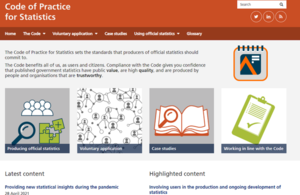皇冠体育app Code for everyone
Ed Humpherson explains how the work of the Office for Statistics Regulation supports the Government Analysis Function

Good analysis is inherently multi-disciplinary. It draws on a range of professional perspectives and it is driven by providing insight into problems, and answers to questions.
So too is the work of the Office for Statistics Regulation(OSR). We support the entire analysis function.
We do this in two ways.
First, through the . This Code is not a set of rules for rigid application to official statistics. It is a philosophy, built around three principles: trustworthiness, quality and value; and it is a philosophy that focuses on how to support confidence in analytical work.
皇冠体育appse concepts of trustworthiness, quality and value should underpin all analytical work. Trustworthiness is about providing evidence of how you鈥檝e followed a rigorous process, had rigorous governance. It aligns closely with other sources of guidance, like the Aqua Book. Quality is about ensuring that the figures that you produce are not misleading 鈥� that they represent the best estimate based on the data available. Quality is consistent with professional guides like the Green Book. And value is about ensuring that your analysis addresses the questions raised by your customer 鈥� whether that be a Minister, a policy team, or a Parliamentary committee.
Indeed, the idea of value that is a core part of the Code is central to good analysis. Good analysis enables the relevant department or agency to make good policy, deliver good services, address risks and create opportunities 鈥使谔逵齛pp analysis will provide value to an organisation 鈥� it is needing the analysis to support some activities 鈥搘hich in turn provides benefits to society.
So the Code has wide applicability. But OSR wouldn鈥檛 take a role in reviewing or commenting on internal advice within government. Our support, through the Code, is therefore indirect 鈥� but no less valuable for that.
But OSR does support the whole analysis function more directly in a second way: we stand up for appropriate use of analysis in the public domain. This is because a lot of the analysis function鈥檚 work is published in one form or another, and informs public debate. When the Government communicates policy or delivery, it does so not just using the regularly published official statistics. It draws on a wider range of analytical outputs 鈥� economic modelling, social research, operational research, data science.
For example during the coronavirus (COVID-19) pandemic, we have stepped in on several occasions to encourage departments to publish information that Ministers have referred to in their explanations of policy. We鈥檝e done this on rough sleeping, Universal Credit, as well as a range of more directly health-related issues. We have also sought to protect analysis from inappropriate interpretation 鈥� to ensure that the analysis is fairly represented. We did this for example on analysis in Scotland of the impact on care homes of discharging people from hospital.
When we do this, we are quite deliberately standing up for the analysis function 鈥� we want your work to be used appropriately and fairly.
That鈥檚 because we鈥檙e not a regulator of statisticians as a professional group. We鈥檙e a regulator that supports the publication of statistics to serve the public good 鈥� and the focus is not just on official statistics, but a broader range of outputs that draw on numerical analysis. 皇冠体育appy should all be trustworthy, high quality and high value. 皇冠体育appse goals of the Code of Practice 鈥� trustworthiness, quality and value 鈥� are also the goals that sit at the heart of the public use of analysis.
Most importantly, we always defend the principle of equality of access. If the Government refers to a model or a piece of research, it should be easy for the public to access the underlying information.
皇冠体育app word public is crucial here. We do not want to over-reach. We focus on numbers in the public eye. So much of the work of analysts is in fact in support of policy and operational decisions within Government 鈥� for example, looking at the potential impact of different policy options. 皇冠体育appre are fantastic tools available to support this work 鈥� the Green Book and the Aqua Book for example. We don鈥檛 see OSR as having a role in this crucial aspect of analysis.
But when analysis goes into the public domain, the Code鈥檚 principles are all triggered. And especially the principle of equality of access.
So perhaps the message of this blog is this. It doesn鈥檛 matter if you鈥檙e a social researcher or a geographer; an operational researcher or an actuary. 皇冠体育app Code is a framework to support confidence in your work no matter what the audience. And whether or not your analysis goes public, think TQV: trustworthiness, quality and value!

Written by Ed Humpherson, Office for Statistics Regulation